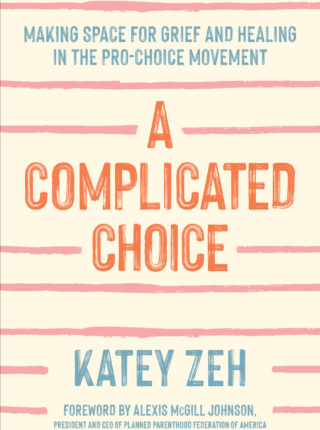Book Review: “A Complicated Choice”

As someone who has written publicly about my experience of abortion, I deeply appreciate Katey Zeh’s approach in “A Complicated Choice: Making Space for Grief and Healing in the Pro-Choice Movement.” Like many of the storytellers in Zeh’s book, I did not expect to find myself in need of an abortion. As a young, Catholic, and married seminary student, I was excited about my pregnancy. But health complications and issues of fetal development slowly transformed my excitement into a series of life-altering medical decisions and, finally, the choice to have an abortion. I was at a major university with access to the best reproductive healthcare. My professors and part-time employer responded with flexibility and understanding. I was accompanied by family, friends, and a Catholic chaplain who offered spiritual support. My story is not the stereotype of anti-abortion propaganda, and neither are the stories collected in this book.
Zeh’s storytelling craft is an example of, as she puts it, “creating a culture of compassion around abortion.” That is to say, the act of reading of the book builds readers’ compassion muscles. In this process, Zeh — an ordained Baptist minister and CEO of the Religious Coalition for Reproductive Choice — also offers the reader a way to understand the often complicated and hidden interweaving of systemic oppression. She resists simplifying choices about pregnancy and abortion that make the reader confront their own stereotypes and highlights how relationships, finances, insurance (or lack thereof), age, race, geography, religion, and physical and mental health impact reproductive decisions.
This book is a significant contribution to dismantling abortion stigma in ourselves, our churches (if we read it together), and in reproductive movements. The stories, which Zeh refers to as “sacred wisdom,” come from volunteers she interviewed during the COVID pandemic. The storytellers’ experiential diversity provides a rich and complex reality around abortion that puts flesh and emotion on statistics. The storytellers Zeh interviewed span a range of ages — both when they shared their stories and when they experienced pregnancy and abortion. They come from across the United States. Some were employed, others not. Many experienced relationship difficulties before and after their abortion decisions; some were victim-survivors of intimate partner or familial abuse. In particular, I appreciate that Zeh lifts up issues of mental health throughout the book. Often anti-abortion advocates try to limit the discussion about mental health and abortion to a falsified claim that abortions cause mental health issues. Instead, Zeh asks about the “mental health risks in not having an abortion.” Dealing with mental health issues in the current healthcare climate has many parallels to experiences of abortion when we consider stigma, lack of health coverage, limited access to providers, and known racial disparities. Zeh both debunks the myths of anti-abortion advocates without giving up any complexity related to mental health, pregnancy, or reproductive loss.
As a seminary professor, I find especially interesting the way that Zeh educates the reader on the historical links between white supremacy and Christian nationalism that persist in legislative policies, legal practices, and theological teachings. Chapter 5, “For the Dignity of Young People,” is a prime example of the ways these factors collude to deny pregnant teens’ control of their reproductive lives while also restricting access to resources, education, and support. Each story is told in a way that illustrates how the storyteller and the reader’s experience “is intertwined within a larger human story of reproductive injustice and oppression.” Zeh lifts up biblical narratives to debunk a “theology of shame and silence” in favor of a compassionate God who is always with us. The theological vision Zeh casts is one that welcomes “disenfranchised grief” and pushes against the “invalidation of loss” that many of the storytellers name. In fact, many of them believe sharing their stories is part of healing, and they often work with organizations that help others to do the same. I find that to be true in my own experience.
Zeh’s conclusion provides next steps for the reader. Though many of the ideas are individual, the reader is encouraged to engage their community in conversation. I am most hopeful that readers discern ways that their faith communities can offer compassionate care, taking the lead from references to religious leaders across denominational affiliations throughout the book. These stories, just like ones from those who experience abortion, are necessary to combat the overwhelming stigma and false stereotype that all religious leaders, especially Christians, condemn abortion. We need a similar text that tells the stories of how religious leaders, ordained or lay, and especially those who are Catholic, cultivate compassionate care and affirm pregnant people’s reproductive decisions including abortion.



